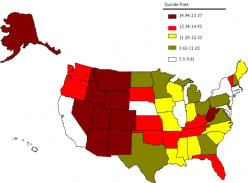Does religion cause depression?
- Rad Manposted 12 years ago
0
People's faith in religion may say it makes them feel good right down to their souls but, they are still more likely than an atheist to get depressed, according to a new study.
"With states like Mississippi, Utah, Arkansas, Louisiana, and Alabama in the top 10 with its strongly held religious beliefs, they were also the top 9 states of those on anti-depressants. Utah residents (the second most religious state) in particular are twice as likely to be prescribed an anti-depressant than the overall American population."
Annie Elizabeth Martin
http://guardianlv.com/2013/09/can-relig … epression/
Spiritual and religious beliefs as risk factors for the onset of major depression: an international cohort study
http://journals.cambridge.org/action/di … 1712003066
It's hard to argue with stats or at least it should be.Not very hard to argue with either of those. Both indicate a link, neither indicate causality although both insinuate religion causes depression.
That there is a link between the two does NOT mean that being spiritual or believing in a god causes depression. It is just as likely that the depression causes people to search out relief in the form of religion.It's also possible that people prone to believe in God are more prone to depression. However I wonder if believing in an invisible, undetectable God alters the brain and makes the ego and makes it less in control of the mind?
True. Being prone to belief in god could mean that one is prone to depression as well. There is still no causal link, though.
I doubt it if belief makes the mind have less control over itself.I think belief does force the brain to give up some control. I was at funeral yesterday and all the priest talked about was having faith when it makes no sense to and that is all that God wants from us. He said if you do that you are guaranteed to get into heaven. If forcing your brain to do so you are altering it's biology the the brain has changed. Perhaps one of the changes is that one becomes more prone to depression.
Love ya hon, but I think you might be stretching a bit on this.
Sure maybe, but I'm not stretching the statistics. And I'd love to know why.
Just looking, I see a large percentage of poor states on there. And a lot of rural states.
Here is the actual non-biased data...
http://www.mentalhealthamerica.net/go/state-ranking
You'll see blocks of states with certain symptoms, which would suggest that climate/geography might also be a causation. In addition, you'll also see that economic barriers to treatment also factor in.
Here's a map of suicide rates... anything jump out at you?
Having known a pretty fair share of rather ego-driven religious people, I would question that conclusion. The rate is not any higher than I've observed in non-religious people (and I've certainly known plenty of both) but frankly my own observation is that both sides tend to show the same sorts of behaviors to the same relative degree, even if they express it using slightly different language.
I again agree, so can we conclude that faith is not helping.
That's a little too pat. Faith certainly doesn't help everyone, there is no question about that, but there are some people who it does help (yo!) and there are some who it helps a great deal. And there are some who get no spiritual or psychological benefit at all. But it's not like it doesn't help anyone.
2011 suicide statistics
Religious asylum known as the USA = 12.00 per 100000
Godless asylum known as China = 22.23m per 100000
Greenland however must be the most religious country in the world = 108.1 per 100000I have heard that the rate of suicide is highest amongst Chinese women as they are so devalued in their own society.
That's the problem with hearsay, it's usually wrong. China is 7th on the list of countries with the highest suicide rates, with men topping the lists.
According to the Department of Health and Human Services, depression is the second leading cause of death for Asian-American and Pacific Islander (AAPI) women between 15 and 24, who consistently have the highest suicide rates among women in that age group. AAPI women over 65 have the highest rates of suicide among all races in that age group.
http://www.pbs.org/wnet/need-to-know/he … sion/4200/Interesting. How many of these "Asian American, and Pacific Islanders," live in China?
Why do you want so desperately to fight? I had just heard something to the effect of my statement and this info must be the basis from which my belief came from. It's just information... no need to feel so constantly threatened.
So - none then? Just don't like lies being spread as facts. Do you feel threatened by actual facts and information?
"I have heard that the rate of suicide is highest amongst Chinese women as they are so devalued in their own society."
Is what you said. Turns out that was nonsense and here you are arguing and fighting anyway.
I wont fight with you. It's childish and meaningless. If you need facts, google.
No - determining truth is not childish and meaningless. Sorry - I will continue to call you on it.
So when I said I had heard that the suicide rate is high in China for women... was that untrue?
Also, it is. So was that untrue?
Or was it untrue when I said maybe the facts that I shared in my 2nd post might be the actual facts that lead to what I had heard?
You.
Just.
Want.
To.
Fight.
With.
Any.
One.
Who.
Believes.
In.
God.
It's.
Pointless.
ATM.Sorry if seeking honesty upsets you. I can see how it would. This is why your religious beliefs cause so many fights.

And there it is. Way to bring it home! I was afraid for a moment you wouldn't be able to slip it in there, but of course you found a way. Keep it up, these threads aren't the same without your mantra. I'm going to start a thread called "Why I like the color blue." I'm sure you can find a spot for it somewhere.
I think maybe some of them were a little depressed.
I think the thing that causes depression is the person's perception, idea, and belief of what they are hearing in religion determines whether it has an influence on depression. It is also how they interpret what others are telling them. For instance, if you really believe you are going to hell because this is the message you are hearing if you don't act a certain way, or focusing on your sins so much and God is not a forgiving, or judgmental God, you beat yourself up with that information. So it's not religion, but basically can be influenced by the people around you, what they believe, and projecting this on you, and you believe the same thing.
There are many studies to suggest religious people have higher levels of life-satisfaction and happiness. Furthermore, the study you've quoted can be explained by any number of other possibilities:
1. Atheists feel depressed when everyone around them is in a state of apparent bliss.
2. Those states are warmer are they not? Perhaps temperature affects people's level of irritability, creating a negative mood.
3. Those states are poorer too right? That will also affect mood.
I haven't read the link, but from what you've quoted, this is a correlation with no proven causality. You could equally say that people from Utah buy more pickles in Walmart, therefore religion makes people want to eat pickles.
It looks like a someone is just trying to sell a story to the press by going through a database of statistics and tying 2 unrelated things together.
As someone who studies religious emotion, it flies in the face of every study I've seen on the matter. The appeal of religion is the comfort it gives people, and as an atheist, I find that to be one of the biggest arguments for its falsehood.Perhaps you should have read the first link? Here is a section of it.
"With nearly 8,000 participants followed for up to a year in countries ranging from Spain, the Netherlands, Portugal and Chile, researchers looked for those of religious faith and those of spiritual practices without a connection to a specified religion in rural and urban settings to see whether there was a strong linkage to their beliefs and their struggles with depression. Conducted out of several U.K. and European universities, the study was recently published in the journal of Psychological Medicine which found that the participants with the strongest sense of a religious mindset at the start of the study had a higher risk of experiencing depressive symptoms over the course of the study."There's no causality. For example, you could say that a higher number of depressed people develop religious beliefs in the hope that it will make them feel better. Having religious beliefs may actually help a lot of depressed people; but some will find religion to be insufficient. Was there any information on how they felt before becoming religious? I know many would have been young, but trait anxiety (main cause of depression) has a genetic component, with the disposition often forming in early childhood. If someone has a disposition for anxiety, religion may help, but they'll still be more likely to experience depression at some point. So, far from causing depression, religion may actually help some to get over it.
Precisely why I keep asking questions. It's an interesting study.
My question would be what was the purpose of engaging in the study?
Deleted
Very true. As long as we always remain aware of bias in all research, it cannot hurt to gather as much information and sift through as much information as possible because somewhere in the muddle there just might be something useful---something that can be of some help to someone.
I cant seem to find any reports on depression amongst research scientists, I wonder why that is?
Surely scientist are effected by depression just like anyone else.
I couldn't get into the original link for some reason, was the research quantified by how many atheist suffer depression or was it just aimed at religious people?Since it was the ABSTRACT... the exact number of each group, their religions, the methods of data gathering, the number of participants from each country etc. were not indicated.
An hypothesis drawn on incomplete information then.
Not only that, but the journalist in the first article twisted what little the abstract DID show.
Seriously, if I thought the data was conclusive or even showed what the journalist says it did, I would be onboard. I don't care if the religious are more depressed or not. But I hate sloppy journalism and I really hate slanted journalism and I really really hate lying journalism.Hmmm, perhaps I'm not being properly understood, which would be because I'm not properly communicating.
I'm not trying to say religion is flawed and all religious people are flawed and these studies show that. I'm trying to learn about the connection these studies have found. If there is a connection between depression and faith then I'd like to know what it is. Do those prone to depression search out religion or does religion search out those prone to depression?I understood Rad, but you aren't going to find a link between religion and depression in either article you posted... unless it's in the UK. And since the UK was an anomaly in the study, the cause is logically dependent on religion PLUS something else or just a random statistical occurrence.
There are no reliable studies that show a causative link or even a true correlative link between religion and depression. That means either it doesn't exist or it hasn't been studied thoroughly.
There are exactly two related studies to be found in the Cambridge Journal.
One shows no correlation except in the UK.
The other shows that religion does help Major Depressive Disorder in high risk individuals.
MDD is not the same as general depression though.
Honestly, the causative/risk factors of depression are pretty well-known and documented. If there is a connection, it's likely very very far down the list.Results The analyses included 8318 attendees. Of participants reporting a spiritual understanding of life at baseline, 10.5% had an episode of depression in the following year compared to 10.3% of religious participants and 7.0% of the secular group (p < 0.001). However, the findings varied significantly across countries, with the difference being significant only in the UK, where spiritual participants were nearly three times more likely to experience an episode of depression than the secular group [OR 2.73, 95% confidence interval (CI) 1.59–4.68]. The strength of belief also had an effect, with participants with strong belief having twice the risk of participants with weak belief. There was no evidence of religion acting as a buffer to prevent depression after a serious life event.
It doesn't say there was not a difference in other countries, it just says it wasn't significant. However when all countries were looked at 10.5 % compared to 7% is rather significant. What does that mean I don't know. But I find this sentence very interesting "The strength of belief also had an effect, with participants with strong belief having twice the risk of participants with weak belief."Again, not really. The +/- was 5% on this one. Hence the 95% accuracy statement.
So no, 3.5% is not significant, especially when you consider that average include the anomaly of the U.K.
The researchers know that as well. That's why their conclusion doesn't say there is a correlation. If there was, you can damn sure bet the conclusion would have said that. Instead it says there wasn't a positive correlation (i.e. religion didn't help)
Even that weak conclusion was contradicted in another study.
And again, that interesting sentence is from the respondents in the UK.
Sorry guys I mean to edit the grammar errors in that post and deleted it.
Except that's not what the study said.
The study said that those deeply religious ONLY in the U.K. had a significant increase. Otherwise the difference was not clearly indicated.
The journalist lied...I suspect that living in the United Kingdom may contribute to depression...

That said, you make an excellent point. Second-hand information from research studies is even worse than the first-hand information from the studies...
Just for piss and giggles, here's an abstract from the same page that completely contradicts the other findings...
http://journals.cambridge.org/action/di … 1711001516
And abstracts are horrible sources of information, in general. The one all this hoopla was based on doesn't even answer it's own thesis in it's conclusion. In layman's terms that means "Um yeah, we didn't prove it at all, but here's what we think our data shows"
I'm not sure that religion or even Christianity is the problem per se, if there is a link between religious beliefs in these states and depression. Let me suggest that depression results from the bullshit that proceeds from many pulpits.
If preachers are going to sell snake oil such as:
- Get rich quick divine lottery financial schemes aka sowing and reaping.
- promises of miraculous healing if the sick have enough faith.
- you are going to hell if you are gay, communist, Muslim, liberal, blah blah (insert any moniker that isn't 'born again spirit filled bible believin' as appropriate)
- come and be a 'God Chaser' and be one of the special elect Jesus favourites.
One day people wake up and come to see thus stuff just doesn't work. Their lives are still the same; full of trouble and strife, and all the preachers can offer are meaningless platitudes about how the devil is harrasing them because he knows they love Jesus, and all they need is to hold on to their faith. They find themselves on a perpetual treadmill of 'Christian image management', plastic smiles and pleasantries, trying to live up to an impossible man made corporate creation of what a Christian should be which is ramed down their throats every Sunday. They start to question their faith built upon sound bites but the then get scared because if they doubt too much they'll backslide and go to hell where their punishment will be worse than for unbelievers because they 'walked away'.
Its all vanity, meaningless, self deluded bollocks. Is it any wonder they are depressed?The article you cited basically gives the answer as to why this is the case. "While it is found in many that those experiencing hard times tend to lean towards a more spiritual outlook, researchers believe this explains the mental health and depression linkage". Makes sense if you're already depressed or anxious and you turn to God or a religion that the results would be high for theists to be depressed. I have personally noticed this in my own church, where a good majority of people turned to God because of something tragic in their life. A follow up article to this would be interesting to see how many of these same people worked their way through their depression due to being in a religion.
I can't name one person that was not religious (did not believe in God) and became religious to overcome depression. Most of the Religious people I know were raised in their religion.
I converted to Christianity to overcome severe depression/grief. It didn't work for that purpose, but it did keep me from actually killing -absolutely no joke- the person I held responsible for my son's death. So yeah.
I actually hear this story all the time at the church i attend. My answer basically is do to whats in the article though. If any of the information is to be taken seriously, then all of it must be.
Having read the abstract of the Cambridge study, I noticed that it said the only country with a significant difference between religious people and atheists who suffered at least one incidence of depression (i.e. this was not necessarily an ongoing, long-lasting or life-altering circumstance,) is England. If you know the history of religion in England, where Christianity lacks the dynamism of the US or African countries, this is not really a surprise.
You're right, it's hard to argue with statistics, but it's dead necessary to actually understand those statistics and not simply toss the first thing that comes to mind out.
There are so many other questions that need to be asked in order to understand it properly.Just to point out Chris, the study didn't indicate which religion the participants were.
This is true. And it's well known that in England, as in many European countries, the Muslim population is highly segregated from the 'mainstream' population for a number of reasons. So certainly a religious person who is living in a country they weren't born in, don't speak the language of, and feel that their culture is disrespected in (not to mention the difficulty finding work) might be prone some kind of depression.
Several have mentioned folks facing or heading toward depression seek resolution, and in so doing are likely to explore some sort of religion. If they don't find their remedy in whatever particular religion they tried, the problem continues to escalate, but at this point they are now associated with religion.
In that scenario, attributing depression to religion would be like attributing death to nursing homes because more folks die in nursing homes than apartment complexes.
- Emile Rposted 12 years ago
0
Country music. All of those states are big country music states. Country music causes depression and makes you more susceptible to pondering suicide. I've read studies.
Oh. I've also read studies that atheism has a higher suicide rate than religious counterparts.
There is a study, with supporting data available, to shore up any view. Dontcha just love the media? They help us all hunker down on our opinions and believe them to be facts.Look outside your own country for a second and have a look at the studies I've posted. Sampling the same areas in a bunch of places cancels out culture and geography.
Rad, one article listed depression stats FROM the US (and used the quote that you posted btw, which only relates to the US). The other was an abstract of a study, not the study itself. And even the abstract reported at most a three percent difference between religious and secular... considering that most studies have a +/- of 3% to 5%... it really doesn't mean anything.
Except the depression rates of the religious/secular in the UK, which were significantly higher in those who were religious.
Which begs the question: What is so different about the UK than the other countries studied? Obviously there is a change in a variable somewhere. Since the religious aspect was consistent, the variable lies elsewhere... logically."Results; The analyses included 8318 attendees. Of participants reporting a spiritual understanding of life at baseline, 10.5% had an episode of depression in the following year compared to 10.3% of religious participants and 7.0% of the secular group (p < 0.001). However, the findings varied significantly across countries, with the difference being significant only in the UK, where spiritual participants were nearly three times more likely to experience an episode of depression than the secular group [OR 2.73, 95% confidence interval (CI) 1.59–4.68]. The strength of belief also had an effect, with participants with strong belief having twice the risk of participants with weak belief. There was no evidence of religion acting as a buffer to prevent depression after a serious life event."
Yes I read that. If the crux of your argument is that religion is not a buffer against depression, then that's a completely different argument than religion causes depression.
Now, getting back to what WASN'T said in the abstract... and why the depression of those religious in the UK might be...
"However, the findings varied significantly across countries, with the difference being significant only in the UK, where spiritual participants were nearly three times more likely to experience an episode of depression than the secular group [OR 2.73, 95% confidence interval (CI) 1.59–4.68]. The strength of belief also had an effect, with participants with strong belief having twice the risk of participants with weak belief."
Now, might you wonder WHY the religious in the UK, especially those who are extremely devout, might be more prone to depression. The abstract (again not the whole paper, that's significant), pointedly leaves out WHICH religion the believers believe in. I would imagine a Muslim, especially an extremely devout Muslim, in the UK might have some reason to be slightly depressed... All things considered.
That depression likely doesn't arise from his belief, except if we include depression caused by the reaction of others to his belief.
That aside, this paper is likely to be torn to shreds by peer review.
You ask why? For the same reason your argument is becoming weaker.
The conclusion:
These results do not support the notion that religious and spiritual life views enhance psychological well-being.
The Thesis:
Spiritual and religious beliefs as risk factors for the onset of major depression: an international cohort study
The conclusion doesn't support the thesis. That's because the data doesn't support the thesis. The data doesn't make a clear determination, by any acceptable margin of error, that spiritual or religious beliefs are a RISK FACTOR for depression. It barely makes the conclusion that the notion of ENHANCED psychological well being from religion/spirituality is unsupported.
What if culture or geography were totally relevant on an individual level for some of the suicides? Striving to cancel those factors out would skew the results. What factors which also may be relevant, have not been considered? How many of these people owned cats? Hard to poll those who committed suicide for reasons, so mostly you are going to be left with speculation and spin with studies and stats on this topic.
Hey, you found a study that makes you feel good about your notions. I'm not knocking it. We all do that.
No we don't. I found studies that indicates that the religious are also more depressed. I don't feel good about that at all. I don't feel good about anyone being depressed.
No, you really didn't Rad. You found a ABSTRACT that said that religious individuals are no better off than non-religious when it comes to depression.
I found one about students being depressed
http://sciencecareers.sciencemag.org/ca … t.a1200111
I don't feel good about this either.
Maybe depression is a result of enlightenment?
- mbuggiehposted 12 years ago
0
I think the word "cause" is problematic.
Religion does not cause depression. What may cause depression is poverty---such as that endemic to the states you've listed. And clearly, people turn to religion sometimes (and definitely not always) in an effort to understand and cope with problems such as poverty.
What is lost, it seems, on these researchers is that correlation is not cause; that correlation is not catalyst.
There are many people who find great comfort in faith; great solace in religion.So you say, but the statistics show otherwise.
I am sure you know that statistics can be misinterpreted and manipulated. And I am sure you know that human beings are not creatures easily described and defined by statistics.
Whether you like it or not OR whether you can accept it or not, some people find happiness and solace and comfort in their faith and in their religion.
To deny this is to misunderstand human nature; to misunderstand why some human beings are---and we are and the science has demonstrated it, to have faith and to congregate around religions.
The only way to deal with faith and religion is the way devised by the American founding fathers: To grant freedom OF and freedom FROM religion; to keep religion out of the public sphere, and yet, to do it no harm in the private sphere.Are you saying that these statistics must be wrong?
I accept it and understand it, but the statistics show that the religion are susceptible to depression and that susceptibility is exponential. I want to know why.
Lost me.
Interesting that we have an American telling the world that the ONLY way to deal with Religion is to do as Americans do. Your separation of Church and State is not very complete when the first thing any candidate is ask is what his religion is.Whatever.
You understand my point about statistics completely. It appears you have an anti-religion agenda, as do others---including researchers, and you will use anything you can find to support your agenda.
That's fine.
But, as someone who has spent the better part of 35 years doing research and reviewing the research of others---including social science research, it is obvious that the researchers' claims upon which you are relying are a clear and classic case of "putting the cart before the horse".
And as for America's approach to religion, it works. We have both freedom of and freedom from religion in America. Not everything that the Founding Fathers did was wrong or inferior or deceptive.No this is not about Religion, it's about depression. What causes the religious to become depressed more often than the unreligious? Is it the religion itself altering the brain or do people who a predisposed to depression find faith?
As a side note, do you feel your politicians have freedom of religion if they want to serve an office? Seems the first question that is asked of him. Obama was forced to change where he worshiped. So much for freedom.What causes students to become more depressed than non students? Or a higher percentage of undergraduates to be more depressed than post graduates? Its probably more to do with environment than any single factor.
So, if they do find happiness and solace in their faith and religion, does that give them the right to deny facts and evidence about the world around us? Sure, but it only makes them look completely dishonest.
Obviously not and I did not suggest that in any way. I am a champion of separation of church and state in the public sphere.
But, an anti-religion agenda is no more honest than is a pro-religion agenda. Hammering away at people because they have faith or religion by making claims that religion CAUSES (the nuanced point of my comment was questioning the notion of causation) depression---no matter how replete with statistics a study may be, is specious at best AND no different than studies that claim that being gay CAUSES depression.All these things need to be studied to find out why the statistics show what they show. Studies that find a connection with homosexuality and depression wouldn't surprise me as they live a hard life, no thanks to the religious.
If studies show that being gay causes depression, then we must accept that.
Really?
Are you aware of the fact that a competent researcher can basically get any response that he or she wants from a respondent---responses that will prove his or her point, simply by asking the "right" carefully designed questions?
And if 10 studies claim that being gay CAUSES depression and 10 studies claim that being gay does NOT CAUSES depression, then what do we do?
The answer is obvious isn't it?
We claim that the 10 studies that support our position and/or belief are right and objective studies done by competent researchers and that the 10 studies that do not support our position and/or belief are wrong and subjective studies done by incompetent researchers.Is that supposed to be a joke? Competent researchers do not carefully design questions to get specific answers that they want to hear, that is bs.
No...not at all.
How many scholarly and/or peer-reviewed research studies have you designed and conducted? How many academic and professional researchers have you worked with?
The most common and most legitimate complaint about research studies is their inherent biases; biases most often derived from the questions asked and from how the questions are asked and from what choices of answers are offered to respondents.That is a red herring.
That is entirely false. It would certainly appear it is you who does not understand the peer review process and how studies are conducted.Identification of research problem
Literature review
Specifying the purpose of research
Determine specific research questions or hypotheses
Data collection
Analysing and interpreting the data
Reporting and evaluating research
Communicating the research findings and, possibly, recommendationsAnd do you really think that this is all that happens?
Don't you think that at the "determine specific research questions and hypotheses" point that there is discussion as to tailoring one's research questions to fit one's hypothesis?
Are you aware of the fact that it sometimes takes teams of people weeks and months to develop questions that they deem suitable to their research agenda?
Whatever. Believe what you will if it makes you feel better.
I should assume then that you have published in scholarly and peer-reviewed journals; have designed undergraduate and graduate research projects; and are an authority on designing and conducting research for publication.
Again, how? The statistics don't in and of themselves 'show otherwise.' If they do, please explain.
Well the statistics in this case show more religious people are depressed rather than less.
Yes, I don't argue against that. The real question (and I'm not arguing either for or against here) is: "Is religiousness/faith the reason (in whole or in part) that more religious people have at least one occurrence of depression."
- mbuggiehposted 12 years ago
0
I think the word "cause" is problematic.
Religion does not cause depression. What may cause depression is poverty---such as that endemic to the states you've listed. And clearly, people turn to religion sometimes (and definitely not always) in an effort to understand and cope with problems such as poverty.
What is lost, it seems, on these researchers is that correlation is not cause; that correlation is not catalyst.
There are many people who find great comfort in faith; great solace in religion. - mbuggiehposted 12 years ago
0
I think the word "cause" is problematic.
Religion does not cause depression. What may cause depression is poverty---such as that endemic to the states you've listed. And clearly, people turn to religion sometimes (and definitely not always) in an effort to understand and cope with problems such as poverty.
What is lost, it seems, on these researchers is that correlation is not cause; that correlation is not catalyst.
There are many people who find great comfort in faith; great solace in religion.I just joined Hub and saw this post , it caught my attention b/c I believe in God , I am on antidepressants , I have attended church , been to many church functions , groups and so on. So I wanted to comment. Everybody might need to be on antidepressants. Everyone has been through something in their life past , present or future that is ,was , or will be devastating to them. People out of church self medicate themselves and never get the real medical treatment they need for their depression. People who go to church try not to seek help for depression , telling themselves they are healed in Jesus name and its covered under the blood of Jesus. BUT! When you take problems from your life , go to church and start doing right , never get the medical attention you need for trauma and depression , think everything is gonna be hunky dory , THEN you struggle with trying to be the best Christian you can be , going through the motions , going to functions , trying not to do drugs , trying to read your Bible. Then you are putting more stress on yourself because you are just being religious , trying to save your own soul from hell and you can't only God can through His son Jesus. And that's what you have to have faith in. But life is stressful and sometimes when u try to do good , you don't always succeed. Then you have some people that judge you for failing. So , yeah ...I can see why depression would be linked to religion.
Thanks for sharing your experiences Bloghawg. Do you think people who become religious were happier before they converted?
Thanks for sharing. I always thought it was interesting that some of the heroes of the faith struggled with depression. DL Moody for one, and CS Lewis with the death of his mother, best friend and wife. Life sucks sometimes. It's hard to be joyful in every circumstance, but we must persevere. We must keep pressing on. Yes, it builds character, but more than that, there is joy in overcoming. Running a marathon can be hell, but ending the marathon, having done your best, is victorious. Sometimes survival is the gift. We should all be encouraging each other... depression is obviously not a problem solely for believers... it is a human condition that crosses every border... male, female, young, old, intelligent, mentally challenged, athletic, overweight, beautiful, unattractive, American, Nicaraguan, Christian, Atheist.... ALL of us. Hang in there every one... you're gonna make it!
how many people participated in this study? what was the study group size?1000 people? 10 thousand? its very easy to dispute the findings . just because 60 out of a hundred people asked agree. doesn't mean 60% of all people agree.
hello rad nice to meet u. im civil.but i dont golf.im not religious or a atheist
Hi aware. Nice to meet you. I try to be civil, however I sometimes fail. I don't like golf. I'm not religious as I'm an atheist, but that is not something I discuss with friends as I'd like to keep them as friends, they don't bring up the topic so I don't. I enjoy cycling and walks in the park. I sometimes exercise my liver in the evening.
Related Discussions
- 58
Intolerance Towards Religion
by thirdmillenium 10 years ago
It is quite understandable for the rationals to pity the believers for their purported ignorance and obstinate adherence to their religious beliefs. They think they know the truth which may well be the case. What I do not understand is the way they put down the believers as though they were some...
- 32
What makes you believe in your particular faith?
by Liam Hallam 14 years ago
I'm in the position of choosing not to follow a religion. Why do you follow your choice of religion? Do you consider you have a choice in your religion? Ans would you ever consider or have you considered switching faith?
- 10
What makes your religious belief unique?
by wayseeker 13 years ago
What makes your religious belief unique?
- 55
If you do not go to church, but you believe in God, are you still considered rel
by Nichol marie 10 years ago
If you do not go to church, but you believe in God, are you still considered religious?
- 392
Religion vs Delusion
by Kiz Robinson 15 years ago
I haven't posted on the forums in this section with a serious topic in a long time, but I'd like to get some of your thoughts.Please keep commentary on this topic to a discussion of ideas, bash the idea all you like, but leave personal battles and insults at the door. Thanks!So:My husband and...
- 8
Do people choose a religion or does a religion choose them?
by Readmikenow 8 years ago
Do people choose a religion or does a religion choose them?If you're raised in Israel chances are you'll be Jewish. If you grow up in Saudi Arabia, good chance you'll be Muslim and if you grow up in Rome you have a good chance of being Catholic. Yet, people leave their religions and choose...




















